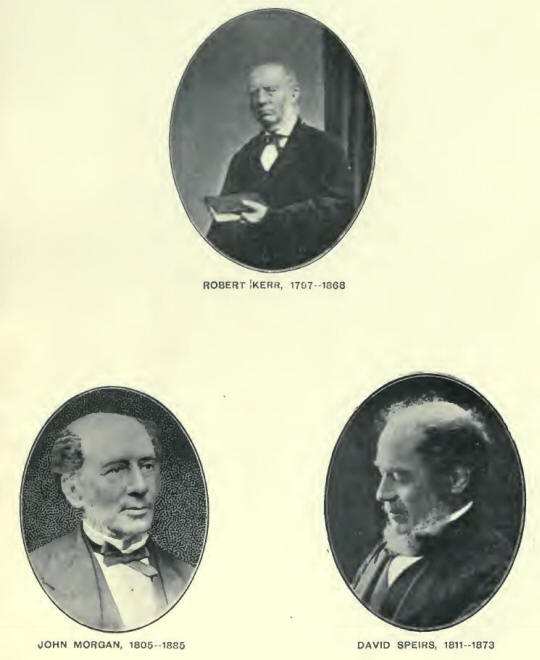|
THE shawl warehouses were for the most part situated
in Causeyside Street, called always the Causeyside, and reminiscent, no
doubt, of the time when it would be the only street that was paved. The
aspect of this Street in the palmy days of the shawl trade, in the forenoon
of a busy day, was very interesting. The salesmen, always well dressed,
might be seen in black surtout coats and shining satin hats, with a flower
in the button-hole, lounging at the front doors on the look-out for buyers,
expected by the trains from Glasgow. When they did find a customer, they
smilingly took him in to inspect their stock, and the transaction among a
certain class, often ended by a walk up to "Peter's," for a social glass.
In the intervals of trade, these important individuals
had to content themselves with polishing the sides of the front door. Cigars
were forbidden, and the era of the cigarette had not yet come. At such times
it was rather an ordeal for a Paisley young lady to pass down the Causeyside
through a double row of these observing and admiring gentlemen, although it
has been recorded that some of them rather relished it. The street was
lively with the dyers' little covered vans, taking away or delivering the
yarn. Weavers with round Kilmarnock bonnets might be seen conveying away
their webs, in clean white linen bags, and numbers of girls, with shawl over
the head, bringing the shawls that they had been fringing or embroidering.
The harness shawl manufacturers gave employment to a great many subsidiary
occupations, and these men were constantly moving about the street,
designers, dyers, croppers, calenderers, finishers, and many others.
We re-produce in .Plate 14 portraits of three of the
more prominent shawl manufacturers, out of many that might be named, did
space permit. Robert Kerr, John Morgan, and David Speirs, in their various
lines, did much to extend the reputation of the shawl trade, and many of
their productions, still carefully preserved, are among the finest specimens
of this class of work. We have further been enabled by the kindness of
Joseph Fulton, Esq., of Glenfield, to re-produce a photograph of a group of
well-known Paisley men, the greater number of whom were connected more or
less directly with the weaving trade. (Plate 1.)

It is characteristic of the homely manners of the time,
that these men should have walked out (for cabs were scarce then in
Paisley), to the classic Braes of Gleniffer, two miles south of the town, on
the Queen's Birth Day, Thursday, 29th May, 1856, to enjoy the hospitality of
the genial Laird of the Glen, the late William Fulton, Esq. Holidays were
few in those days, and this was no doubt a great occasion. Photography was
in its infancy, but Mr. Archibald Barr, son of one of the party, had some
distinction as an amateur photographer, and to this fact we owe this
interesting picture.
Mr. Fulton always took a
great delight in the society of the old weavers, especially such as were
"characters," or who attempted poetry, or at least rhyme, and there was
generally a goodly number of both sorts. He would frequently send in his
bleachfield carts, and bring out a happy company to spend a pleasant summer
day at the Glen, and be regaled with curds and cream. The present group,
however, were the "maisters," or "corks," as they were familiarly called.
They were all men in active business life; some were men of strong
individuality, and the poetical element was not wanting.
The chimney-pot hat was the regular headpiece then for
holidays, and was of gigantic dimensions, and generally ornamented with a
mourning band, so as to come in handy for funerals, which ornament being
kept on for economical reasons, was considered no way out of place on
festive occasions. The hat served for a generation, and during that time, as
the shape in vogue changed, was certain to be in the height of fashion two
or three times. It was the favourite receptacle for loose papers, samples of
cloth or yarn, and for those who snuffed, a race long extinct, it carried
the inevitable spotted Bandanna handkerchief. It will be observed that all
these men are clean shaven. This was the universal custom at the time. Any
person wearing a moustache was looked upon as of doubtful character, or as
one of those foreigners who came over in such numbers as a consequence of
the Revolutions of 1848. But after the return of the troops from the Crimean
War, the wearing of the moustache and beard became general. The clergy were
brought round by the example set by a popular minister of the Abbey.
The names counting from left to right are :-
1. James Balderston, Thread Manufacturer.
2, John Muir, Warper.
3.
John Snodgrass, House Painter.
4. William MacKean, Starch Manufacturer,
afterwards Provost.
5. William Fulton, of The Glen.
6. John Hair,
Shawl Manufacturer.
7. William Philips, Yarn Merchant, Ex-Provost.
8.
James Lang, Leather Merchant, afterwards Bailie.
9. John Neilson,
Printer.
10. Bailie William Russell, Dyer, afterwards Town Treasurer.
11. John Smith, Shawl Manufacturer.
12. James Sharp, Manufacturer.
13.
John Robertson, of J. & J. Robertson, Shawl Manufacturers.
14. William
Anderson, Bookseller.
15. John Macgregor (Poet), Embroiderer, Kilbarchan.
16. William Robb, Manufacturer.
17. James Robertson, of J. & J.
Robertson, Shawl Manufacturers.
18. John Barr, Manufacturer.
i 9.
Matthew Tannahill, brother of the Poet. (Seated).
20. George H. Brown,
Yarn Merchant. (Reclining).
21. Robert Fulton, Finisher.
(Reclining).
22. Robert Clark, Thread Manufacturer. (Reclining).
The last-named gentleman is the sole survivor (1903), of this interesting
group. |

